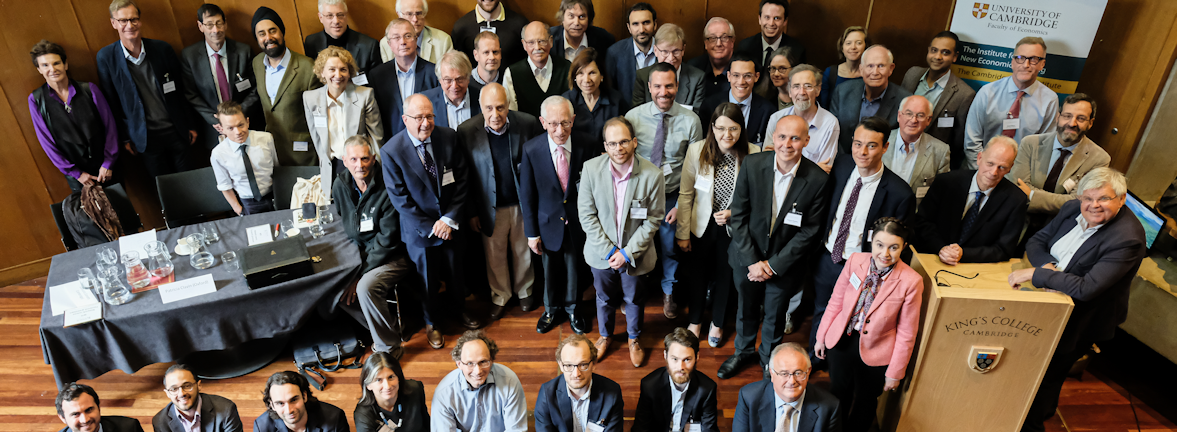

The Centenary Conference on Keynes’s
Economic Consequences of the Peace
King’s College, Cambridge, September 9-10, 2019
Cambridge-INET is proud to announce a major conference on Keynes’s 1919 book. The book is celebrated as a brilliant piece of advocacy by one of the 20th century’s pre-eminent economists. But it is also an accurate prophecy of the con- sequences of a “Carthaginian peace,” as well as a plea for the type of global economic cooperation that later informed key aspects of reconstruction after World War II – including the Bretton Woods institutions (which Keynes helped to design) and the Marshall Plan. With its description of resurgent nationalism in Europe and the breakdown of pre-WWI international economic integration, the book has great resonance today, given growing nationalism, the fraying of traditional alliances, and attacks on the multilateral institutions that have supported economic and financial globalization.
Programme
The programme for the conference has been published.
Scientific and Organising Committees
The conference will include an academic discussion of written contributions as well as a public event. The Scientific Committee of the conference consists of Patricia Clavin (Oxford), Giancarlo Corsetti (Cambridge), Maurice Obstfeld (Berkeley), and Adam Tooze (Columbia). The Organizing Committee consists of Gareth Austin, Giancarlo Corsetti and David Howarth (Cambridge), Michael Kumhof (Bank of England), Eugenio Gaiotti (Banca d’Italia), and Jesper Linde (Sveriges Riksbank). (see full list at the bottom of this page)
Videos
Panel Discussion
This is the full video taken during the panel discussion on the "Contemporary Relevance of the Economic Consequences". Part of the Economic Consequences centenary conference.
Introduction
Professors Giancarlo Corsetti, David Howarth and Maurice Obstfeld share their thoughts on Keynes's "Economic Consequences of the Peace" in its centenary year. Filmed in Keynes's quarters in King's College Cambridge.
Marshall Library Exhibition
Clare Trowell, Marshall Librarian in the Faculty of Economics, tells us about the exhibition the Marshall Library curated
to support the Economic Consequences of the Peace Centenary Conference.
Podcasts
Contemporary Relevance Panel Podcast
This is a podcast recording taken during the panel discussion on the "Contemporary Relevance of the Economic Consequences".
Part of the Economic Consequences centenary conference.
PART I
PART II
Find out more about the conference by listening to this two-part podcast. Boni Sones interviews Maurice Obstfeld, University of California, and Giancarlo Corsetti and David Howarth from the University of Cambridge. This podcast was recorded in the Keynes’ Apartment at Kings College, University of Cambridge.
Marshall Library - Online Exhibition of the Book
Visit the Marshall Library to see a display about The Economic Consequences of the Peace, including original material and books from Keynes's personal collection.
View the accompanying online exhibition curated by the Marshall Librarian
Keynes' annoted Macmillan proof copy is preserved in the Marshall Libary and has been digitized and made available via the Cambridge University Digital Library.
Marshall Library - Blog about the Book
Follow the Marshall Library Blog to read addition research about Keynes and process of publishing the Book.
The Economic Consequences of the Peace Blogs
Photographs
Scientific and Organising Committees
The Scientific Committee of the conference consists of
Patricia Clavin (Oxford)
Giancarlo Corsetti (Cambridge)
Maurice Obstfeld (Berkeley)
Adam Tooze (Columbia)
The Organizing Committee consists of
Gareth Austin(Cambridge)
Giancarlo Corsetti (Cambridge)
David Howarth (Cambridge)
Michael Kumhof (Bank of England)
Eugenio Gaiotti (Banca d’Italia)
Jesper Linde (Sveriges Riksbank)


